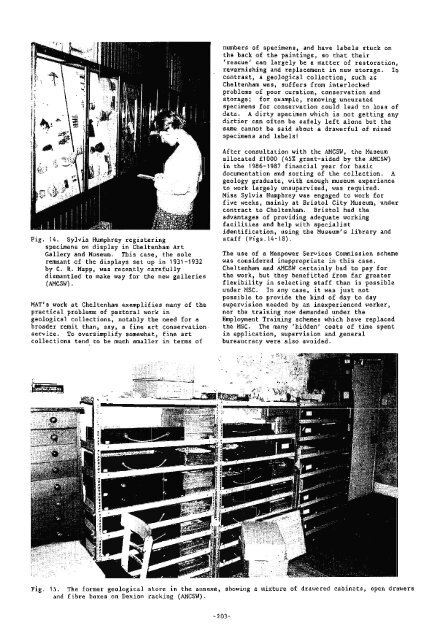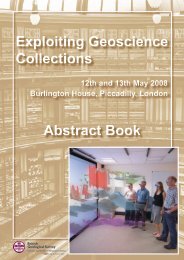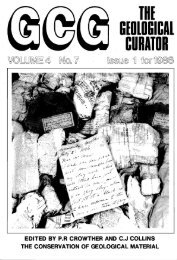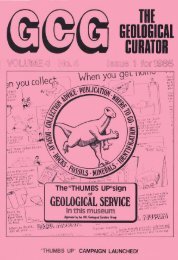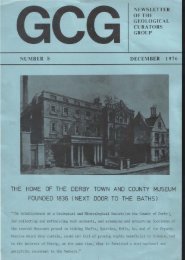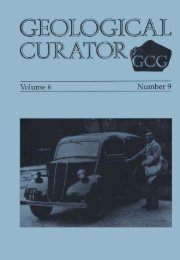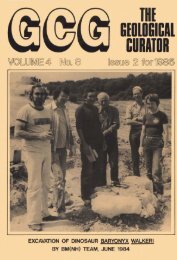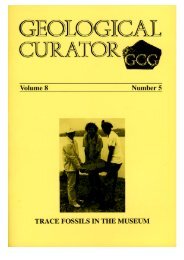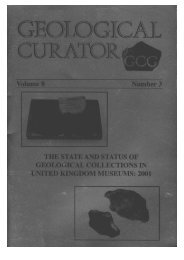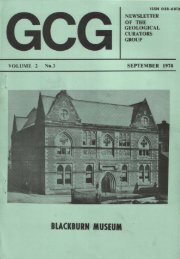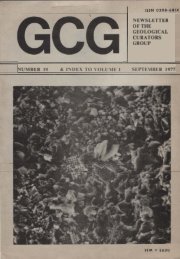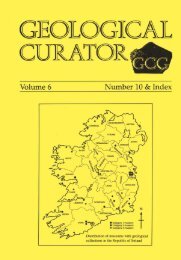numbers of specimens, and have labels stuck onthe back of the paintings, so that their'rescue' can largely be a matter of restoration,revarnishine - and re~lacement in new storaee. InUcontrast, a geological collection, such asCheltenham was, suffers from interlockedproblems of poor curation, conservation andstorage; for example, removing uncuratedspecimens for conservation could lead to loss ofdata. A dirty specimen which is not getting anydirtier can often he safely left alone but thesame cannot be said about a drawerful of mixedspecimens and labels!Fig. 14. Sylvia Humphrey registeringspecimens on display in Cheltenham ArtGallery and Museum. This case, the soleremnant of the displays set up in 1931-1932by C. R. Mapp, was recently carefullydismantled to make way for the new galleries(AMCSW).MAT'S work at Cheltenham exemplifies many of thepractical problems of pastoral work ingeological collections, notably the need far abroader remit than, say, a fine art conservationservice. To oversimplify somewhat, fine artcollections tend to be much smaller in terms ofAfter consultation with the AMCSW, the Museumallocated f1OOO (45% grant-aided by the AMCSW)in the 1986-1987 financial year for basicdocumentation and sorting of the collection. Ageology graduate, with enough museum experienceto work largely unsupervised, was required.Miss Sylvia Humphrey was engaged to work forfive weeks, mainly at Bristol City Museum, undercontract to Cheltenham. Bristol had theadvantages of providing adcquate workingfacilities and help wirh specialistidentification. usine the Xuseum's lihrarv andstaff (~igs.14~18).The use of a Manpower Services Commission schemewas considered inappropriate in this case.Cheltenham and AMCSW certainly had to pay forthe work, but they benefitted from far greaterflexibility in selecting staff than is possibleunder MSC. In any case, it was just notpossible to provide the kind of day to daysupervision needed by an inexperienced worker,nor the training now demanded under theEmployment Training schemes which have replacedthe MSC. The many 'hidden' costs of time spentin application, supervision and generalbureaucracy were also avoided.Fig. 15. The former geological store in the annexe, showing a mixture of drawered cabinets, open drawetand fibre boxes on Dexion racking (AMCSW).-203-
Fig. 16. Caynor Andrews packing specimens intissue paper and bubble-pack for transportto Bristol City Museum in 1986 (AMCSW).Financial planning had to take into account theneed to make the best use of staff time. Forexample, as much as possible of the first year'sbudget of £1,000 was spent on staff casts, andonly those items required for the current year'swork (or the next) were purchased. Fortunately,labels were already available from Dr Curtis'work on the collection, saving time and money.This allowed some five weeks work (the minimumrealistic length of contract), with a ratio of3:l in labour to other costs.Salary, national insurance andtravelFiling cabinet, etc.£766.8676.75Register book, etc.Packing material for specimens55.40(bubble wrap and acid-freetissue) 98.87Total: £997.88To this must be added the hidden costs of:specimen transport between Bristol andCheltenham (absorbed bv Cheltenham centralbudgets); a significant amount of time spent byPeter Crowther and especially Roger Clark(Curator and Assistant Curator of Geology,Bristol City Museum) in organisation andspecimen identification, and some three weeksspent by me as the AMCSW <strong>Geological</strong> Officer in'once-and-for-all' work, mainly reorganising thefiling system of related documents and writingthe documentation system instructions.Funding a project in such relatively smallannual increments has the potential problem oflong breaks between successive workers. In anycase the museum's own non-geological curatorswould need to know what to do from dav to dav. ,.for example when removing a specimen for atemporary display: We therefore took care toensure continuity by setting dawn full writtenprocedures for documentation, loans andsecurity, and recording all work done.First priority was to sort out the collectionand record the provenance of each specimen asfar as possible. If a specimen and its labelwere reunited by inference, especially bysorting out the contents of a drawer, then thiswas recorded. Same 1,270 specimens were sortedand registered during this initial five weeks'rescue curation. As the only specimens withmuseum numbers were those listed by Wild (1920),a completely new manual documentation system wasintroduced, of numbered specimen, label andentry in a manual register, very similar inphilosophy and design to that later recommendedby Knell and Taylor (1989). It deviates fromthe commonly accepted Museum DocumentationAssociation standard by using separate accessionand registration numbers, where the accessionnumber covers one or more specimens in a singleaccession, and the registration number refers toa single specimen. This system was implicit inthe Bristol-style labels inherited from DrCurtis' work; it has the advantage far aneglected collection that a specimen and itslabel can be registered and linked withoutneeding to know the accession number, or usingan 'artificial' numher (such as 1988.1) whichcomplicates matters when a specimen mayeventually he linked to its true accessionnumber.For broadly similar reasons the filing systemfor related documents uses its own runningnumher for history and other files rather thanan accession number, and specimens arecross-linked to files by the file number. Aplain comments slip was used, as this can besuitably marked for use as a removals slip orloans slip.Indexes or detailed catalogues, whether manualor computer, were not an immediate priority, butcould he added in the future if thoughtnecessary, e.g. to conform to MuseumsRegistration.Sylvia Humphrey carried out a further six weeks'work in the 1987-1988 financial year, using asecond grant-aided allotment of £1000. Shecontinued the work of identifying, registering,and boxing specimens at Bristol, recording afurther 1076 fossils and 647 minerals, andreturning all material to Cheltenham. By thenalmost 3000 specimens had been documented at anominal labour cost of 59p each! A thirdgrant-aided allotment in the 1988-1989 financialFig. 17. Part of the geological store atBristol City Museum, with Cheltenham Museumspecimens in the boxes atop the Bristolracks and spread all over the table forcuration in 1986 (AMCSW).


